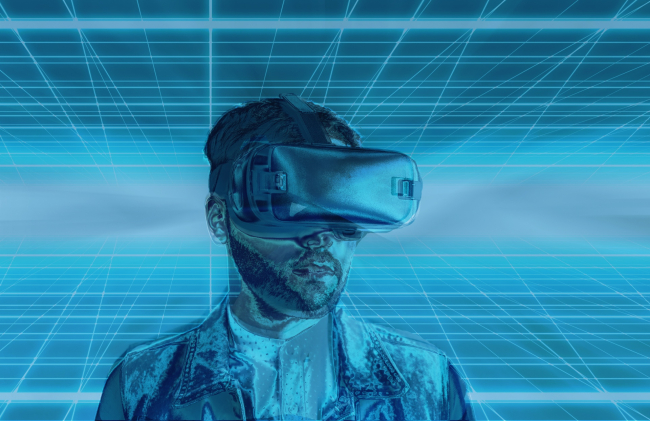
23 years ago, The Matrix introduced the idea of humanity living inside of a computer simulation. While moviegoers at the time wrote it off as a fictional piece of work, in the present day, we are much closer to that all-encompassing, technological world with the metaverse. Despite the promise of virtual worlds, there are still legal challenges and questions that echo those we face in the real world.
The Metaverse
“Metaverse” is a common buzzword in the world of technology, but what exactly is it? With the term first recorded in Neal Stephenson’s novel Snow Crash 1992, the metaverse is currently defined as “a virtual space in which users can interact with an environment generated by computer and with other users.” However, the metaverse is constantly developing, and its definition is no different. Increasingly, people refer to different subareas or genres that are a part of or an example of the metaverse, including virtual reality (VR), augmented reality (AR), and virtual roleplaying games. Fortnite[i], for example, has started referring to their virtual world as a “metaverse” and Oculus[ii] has customizable personal virtual homes. At the same time, calling these spaces the metaverse is equitable to Google calling itself the “internet.” They are simply a part of it.
By way of this ontological thinking—that is, a metaverse is what we decide a metaverse is—we are introducing the concept of a “multiverse of metaverses.” Any single game or platform could be thought of as a metaverse. The move to name every virtual space a metaverse is in no small part due to companies attempting to utilize the buzzword to gain momentum for their products. While corporations have a long history of jumping on the bandwagon of the latest technical trend—think about the sheer number of apps generated in the last decade—the metaverse has the potential to shift in how we interact with technology. Take the digital economy, for example. Users can buy, sell, and create goods, and ideally, eventually be able to take virtual items from one platform to another. There are still challenges to this seamless virtual engagement: no singular company can solve the issue of interoperability, and collaboration often feels out of the question as it might be less profitable for companies to work together. Moreover, we are not at the level of computing to have “portals” from one metaverse to another. Technology development is not necessarily a linear progression like the development of the early internet. The existence of failed, and supposedly revolutionary, investments to further our “hybrid-verse,” [iii] such as the 3D TV, delivery drones, and Google glass is proof enough for companies to be wary.
Further, the metaverse, just like any space we occupy, comes with questions about how we act, interact, and what are the rules and regulations that govern those interactions. To put it more simply, what are the laws of the metaverse? According to Pin Lean Lau, there are three primary legal sectors one must consider in XR:
Property Law
In property law [iv], when referencing a physical piece of art, ownership is two-fold and can be attributed to the actual physical artwork. Depending on the terms of the sale, the buyer may/may not own the intellectual property of the artwork. With digital art, international law firm Reed Smith states that “ownership” in the metaverse—in this case, referring to the use of different platforms—“is nothing more than a form of licensing, or provision of services.” Here, true ownership lies with the owner, and the buyer cannot sell the item without permission from the true owner.
NFTs

With the increased interest in the metaverse, we’re learning more about non-fungible tokens (NFTs) which seem to exist at the intersection of digital and physical property law arguments. An NFT can be an image, music, video, 3D objects, or other types of creative work. Because of their various forms, it’s difficult to determine if they count as regular pieces of digital art or something more. As individuals and companies continue to spend enormous sums to own “property” in the metaverse using NFTs, you begin to wonder what kinds of regulations are applicable to it. Can you apply land law? Can you have a mortgage? Can you sue others for damaging your property?
Data Protection

In the same vein of the potential for personal grievances with extended reality (XR), there is also the issue of the general public’s data safety. With the continued modernization of daily life and companies’ compulsory desire to cater to the needs of their users (sometimes needs that the users themselves hadn’t even considered), new categories for personal data have come to fruition, namely facial expressions, gestures, and reactions. VR headsets collect large amounts of personal physical data from their users. With this expansion in data collection comes the fear of what could be lost during an inevitable cyberattack. Organizations and nations are not fully prepared to deal with the privacy and security issues facing the metaverse as there are not enough qualified people to deal with the complexity of the architecture to develop secure solutions. This fear also does not keep in mind user agreements where companies sell the data they obtained to third parties. In cataloging this information, users lose their right to privacy in microscopic areas of their lives.
Less Answers, More Questions
“Can someone be liable for their actions in the metaverse?” This is a critical question being asked with the development of XR. If one were to give avatars a legal persona, establishing rights and duties within a legal system, what might this mean for society? The distinction between a “legal” avatar and the true legal person who operates it becomes blurred, having a large effect on the ability to prove harm, loss, or injury suffered in the metaverse. Who owns our digital twin? Who is liable for the actions of our digital twin? We all have our place in the metaverse and these questions are just the beginning of much larger developments in the future.
Citations
[i] An online multiplayer game owned by Epic Games
[ii] VR headsets and technology developed by Meta
[iii] Amalgamation of physical reality, internet, and VR
[iv] The legal division that deals with issues regarding property and ownership
About this Author
Angie Cortez, Karp Library Fellow, XR Researcher
September 2022 - April 2023

